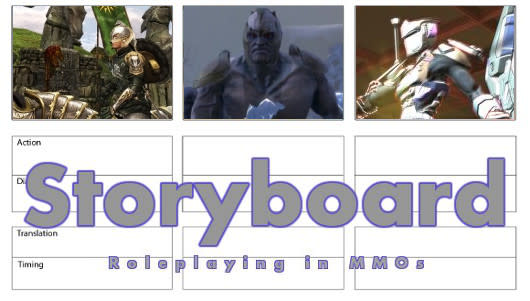Storyboard: Being who you aren't
There is, as I have discussed, a group of roleplayers for whom the game is the thing. If the game doesn't allow you to be a moisture farmer, then why would you want to pretend to be a moisture farmer? Similarly, if you're not actually a master of the marketplace or sitting on huge assets in the game, why would you want to pretend that you are?
I am not one of those people. I'm playing a financial wizard partly because I am not a financial wizard. And it's not that I don't love games where that's a viable option, but that's a different discussion.
However, this does raise the question of how you can pretend to portray something you aren't intimately familiar with. If I'm playing a doctor, I'm going to run into the simple problem that I'm not a doctor in real life (full-time writers rarely receive extensive medical training). All of roleplaying is some degree of pretending to be something you're not, but how do you do so when it's something that's a bit harder to fake?

Google is your friend
So you want to pretend to be a doctor without seven years of medical school. Good news: A fantastic invention exists called the internet, where people will talk about all sorts of nonsense, including, yes, being a doctor. Searching for "doctor stories" on Google brought up about 911 million results when I did so whilst writing this article, so even if only 1% of those survive before this article is published, you'll still have a million things to read.
Not all of this will be relevant, of course. Sometimes people will be posting about that time the doctor was totally stupid (or that time the reader thought the doctor was totally stupid until the reader lost an arm by not listening to the doctor). But the fact is that the internet is currently the most amazing source of general overviews anywhere. You can browse on almost any subject briefly and wind up with a huge amount of casual information, at least enough to picture what an average day of doctoring would look like.
TVTropes, oddly, is also your friend
Just an FYI, this part does contain a link to TVTropes. Trigger warnings for compulsive link-clickers.
You might think that a good compromise between learning to be a doctor and pretending to be one would be watching a lot of medical dramas. Heck, that might be what convinced you to start pretending to be a doctor. But television doctors are generally pretty terrible at being actual doctors; they're there to advance plotlines, not provide actual ideas of how medicine is practiced, so much so that there's an entire page of things listing things medical dramas do that aren't good medical practice.
Here's the trick, though: A lot of that actually doubles as good advice. If you look into what these things are and why television so frequently gets it wrong, you can at least get it sort of right. It's the same principle behind good advice just being bad advice inverted.
Plus, it lends a little more credence to your character's authenticity. Yes, there aren't a whole lot of settings where you can discuss something being a bunch of Hollywood hogwash, but you can at least give the sense that you know more about medicine than the producers and writers of a great deal of television -- unless you're playing Star Trek Online, in which case pretty much all the medicine is about as connected to our understanding of medicine as teleportation is connected to the Model T. The end goal is the same, but the methodology looks almost entirely different.

Friends and family can also be your friend
My mother-in-law spent a long stretch of her life working in nursing. Years of working in facilities as the DNS and as an independent senior care advisor means that she knows a lot about medicine. While she might not have worked as a doctor, she knows a lot about dealing with them, both the good doctors and the ones whom she would have rather never spoken to again.
Not everyone has my mother-in-law as a resource, obviously. But that isn't the point. The point is that your friends and family members have jobs, they have professions, they have experiences with things you might not. Even if you don't have a bunch of people you know who are doctors or in medical fields, odds are good you have a bunch of people you know who have experiences in those fields. You can probably find lots of stories if you're willing to ask.
Yes, some of them are going to be of dubious use, such as Cousin Earl and his insistence that medicine is a scam created by the lizard people to put eggs in our brains. But the worst-case scenario of asking about these stories is that you wind up spending more time getting to know your friends and family. It's a terrible thought, I'm sure.
Brevity is (yes) your friend
So now you've got a whole lot of stuff to draw upon when it's time to pretend to be a doctor, which you are most certainly not. So what's the last key to using all of this information?
Don't.
One of the great temptations after you've done all of this research is to show your work. The problem is that to the people who normally do this stuff, all of your lessons are transparent. Doctors don't talk about being doctors, business wizards don't talk about running a business, and farmers don't talk about crop rotation or animal herding. They just do these things.
The best way to ensure that your character looks professional is to learn all of this and then leave it mostly as background, invisible information that informs your roleplaying. Say only as much as is necessary, and it looks like you know all of this information intimately in real life.
Really, that's the goal anyway, yes?
Feedback is welcome in the comments below or via mail to eliot@massively.com, as always. Next week, I want to talk about the actual mechanics of leaving your old group behind, and the week after that I'd like to yammer on about secrets that aren't doing you any favors.

Every Friday, Eliot Lefebvre fills a column up with excellent advice on investing money, writing award-winning novels, and being elected to public office. Then he removes all of that, and you're left with Storyboard, which focuses on roleplaying in MMOs. It won't help you get elected, but it will help you pretend you did. If you need a refresher, check out the Storyboard Library.


